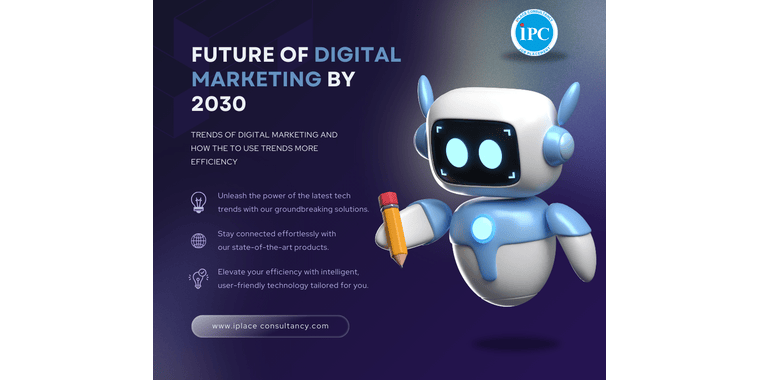The Future of Digital Marketing till 2030 | Exciting Trends & Potential Challenges
The Future Of Digital Marketing Till Year 2030
The digital landscape of marketing is constantly shifting because of technology advances, new behaviors of the consumer, and emerging trends. And while we set course for 2030, things are now brighter: that the future of digital marketing has a lot in store that is going to be far beyond what's happening today. And while it is turning really radical, the future will belong to only those brands that stay ahead of the curve, meaning ahead in innovation.
This week, we present to you the future prospects of digital marketing until 2030, considering the most relevant trends, technologies, and strategies that are set to revolutionize the industry over the next decade. From AI-enabled marketing to metaverse experiences, the future of digital marketing promises to be both exciting and transformative.
• Emergence of Artificial Intelligence in Marketing

AI is already transforming the future of digital marketing and will be even more transformational in the years ahead. AI will, by 2030, pass several significant milestones in all possible features of marketing-from data analysis to customer engagement.
AI can help businesses check huge chunks of data in real time, which may feed insights to highly personal, targeted campaigns. With the application of AI, chatbots, predictive analytics, and recommendation engines can help brands deliver a lot more relevant content and offers to customers, improve both engagement and conversion rates.
AI will continue paving the future of digital marketing up until 2030 by automating every day routine tasks such as content creation, email marketing, and social media management. Marketers can enjoy strategy and creativity as AI takes care of everything else.
• Voice Search Optimization

The popularity of smart speakers and voice-activated assistants like Amazon's Alexa, Google Assistant, and Apple's Siri will impact voice search dominating the future of digital marketing till 2030. More than 50% of all online searches are expected to be voice-based by 2030.
This move in voice search will compel brands to overhaul the digital marketing strategies that they have used so far. Voice search queries tend to be longer and more conversational than text-based searches and therefore requires businesses to content themselves with creating language that is more conversational and answers what somebody may want to know.
Moreover, optimization for voice search will encompass making sites mobile-friendly, quick in load time, and answering questions in the most concise words possible. Such investments early on will keep brands ahead of the curve into an emerging digital marketing landscape.
• Evolution of Content Marketing

While content marketing will continue being one of the essential components of a digital marketing strategy even in the future, it will be used quite differently and changed considerably in 2030. Only when the not so distant future arrives will good quality or engaging content not be enough but highly personalized and interactive content produced by brands themselves be the order of the day.
Personalization will be the way ahead in future digital marketing till 2030. The introduction of AI and machine learning will allow marketers to analyze user behavior and preferences in real-time, where they will be able to deliver content customized to the requirements and interests of each individual. Such a relationship will help brands and consumers have better relationships with great conversion rates and customer loyalty.
Apart from personalization, there would be more emphasis on other interactive content like quizzes, polls, and AR experiences. Brands would find ways to cut through the noise in the increasing digital space through engagingly immersive content.
• Augmented reality (AR) and virtual reality (VR):

Augmented reality and virtual reality will find their way deeper into marketing campaigns. Brands would be able to hook audiences better and create great appeal by making their content deeper and richer through AR and VR experiences.
Augmented Reality and Virtual Reality to Change the Digital Marketing Industry Till 2030 The future of digital marketing will revolve around AR and VR, which are soon going to change the face of marketing for the brands. In integration with each other, these technologies are going to give brands the chance to create a highly immersive experience that will better engage users in ways until now unthinkable.
For instance, in the retail business line, customers will be permitted to use AR, which will help them test products virtually or even try out clothes before purchasing. Similarly, VR can enable the creation of virtual showrooms or tours to facilitate customer experience in a shopping experience from their own home.
As such technologies become even more accessible and affordable, brands from diverse industries will be using AR and VR for marketing purposes to allow them memorable experiences. By 2030, AR and VR will simply become part of the inalienable tools in the digital marketer's toolbox.
• The Rise of the Metaverse

Maybe one of the most exciting developments in the future of digital marketing till the year 2030 would be the rise of the metaverse. The metaverse is kind of a virtual, interconnected space where the user interacts with other users and digital environments in a real-time scenario. Think of this as the next step in the evolution of the internet - where virtual worlds blend into the physical one.
The metaverse will introduce many new opportunities to brands-not just in how they create their virtual storefronts and host events but also interact with the customers in such novel ways. For example, a fashion brand could be having a virtual runway show where users might even watch and shop for the latest designs in real time.
As the consumers spend more time in the metaverse, digital marketing strategy needs to be shaped according to this new environment. One opportunity that brands will have to connect with tech-savvy customers by adopting metaverse marketing is to become one of the first-line players in this emerging space.
• Data Privacy and Ethical Marketing
In this event, data privacy and more ethical marketing practices demand will continue to rise with the development of digital marketing. This, in turn, means by 2030 that the data privacy laws such as GDPR or CCPA may become tougher, and businesses shall have to respond by clearing transparency and consent from the user.
This implies that in the future of digital marketing till year 2030, brands should ensure ethical marketing practices are applied for customer trust. A few of those include being transparent in data collection and usage, clear options on opt-out or in, and most importantly, marketing practices must follow fairness and respect of consumer rights.
Secondly, it would help a brand that could prove its commitment to responsible marketing as consumers are also now scrutinizing data privacy and security. Points
• Sustainable social responsibility digital marketing
The future of digital marketing up to 2030 would be characterized by sustainability and social responsibility. It is imperative that consumers become much more attuned to the broader environmental and social implications of their purchasing decisions, where they tend increasingly toward brands that highlight sustainability and ethics.
Digital marketing campaigns will be extremely effective if sustainability, environmentally friendly products, or even social causes are categorized and targeted to the growing segment of socially conscious consumers. Brands that can actually demonstrate commitment towards sustainability will attract more customers and enhance their brand reputation even better.
From now until 2030, brands are expected to add sustainability to their digital strategies through the products they market and the way of interacting with the market.
• Continued Expansion of Influencer Marketing:
Influencer marketing has gone bonkers over the last decade and there is no end to it. In the future of digital marketing till year 2030, influencer marketing is going to be more influential because consumers not only like and depend but also trust on people they follow on social media for a particular endorsement.
That, however, will change with the much more complex influencer marketing expected in 2030. Micro-influencers and nano-influencers with smaller and highly engaged audiences will form the core of most digital marketing campaigns. Brands will then focus on developing long-term partnerships with influencers aligned with their values who can authentically promote their products or services.
Increasingly, virtual influencers will be used—AI-generated personalities that exist solely in the digital world. Virtual influencers will offer brands a novel opportunity to communicate directly with their audiences in the metaverse and other digital environments.
For More Details About Digital Marketing Visit https://www.iplacetechnologies.com/






